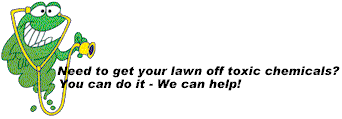Study Shows Herbicides Increase Risk of Non-Hodgkin’s Lymphoma
(Beyond Pesticides, October 14, 2008) Exposure to glyphosate or MCPA can more than double one’s risk of developing non-Hodgkin lymphoma (NHL), according to a new epidemiological study published in the October issue of the International Journal of Cancer. The case-control study finds a 2.02 odds ratio (OR) for exposure (two times the chance of contracting the illness) to glyphosate, a 2.81 OR for exposure to MCPA, and a 1.72 OR for exposure to herbicides. According to EPA, glyphosate is the most commonly used pesticide in the U.S. with 103 to 113 million pounds used annually. MCPA is a phenoxyacetic acid pesticide, a family of pesticides that has previously been linked to cancer and includes 2,4-D and mecoprop (MCPP).
NHL is a cancer of the immune system. There are several different types of NHL, which are differentiated by the type of immune cell that is cancerous, the characteristics of the cancerous cell, and different genetic mutations of the cancerous cells. Treatment for NHL varies depending on NHL type, patient age, and other existing medical conditions. The incidence of NHL has been increasing over the past several decades.
The link between pesticides and cancer has long been a concern. While agriculture has traditionally been tied to pesticide-related illnesses, 19 of 30 commonly used lawn pesticides and 24 of 48 commonly used school pesticides are probable or possible carcinogens. The consistency of the scientific findings linking pesticide exposure to cancer raises serious questions about their allowed use.
In 2002, the same researchers published a study that shows an increased risk to NHL from exposure to certain pesticides: a 1.75 OR for herbicides, a 3.11 OR for fungicides, a 3.04 OR for glyphosate, and a 2.62 OR for MCPA. And even earlier, in 1999, another study by these researchers, published by the American Cancer Society, finds an increased risk of NHL for people exposed to common herbicides and fungicides, particularly MCPP. People exposed to glyphosate are 2.7 times more likely to develop NHL.
NHL has been linked to pesticides in other studies as well, including 2,4-D, the most commonly used nonagricultural herbicide. A 2007 case-control study published in Environmental Health Perspectives finds that children born to mothers living in households with pesticide use during pregnancy have over twice as much risk of getting cancer, specifically acute leukemia (AL) or NHL. A study published in a 2001 issue of Cancer also correlates an increased risk of NHL with exposure to household pesticides. The study examined pesticide exposure routes to children either through the mother while she was pregnant, or directly to the child. Exposed children showed a three to seven time greater likelihood of developing NHL, as compared to unexposed children. In studying different types of NHL, the researchers found that household insecticide use was correlated to a greater risk of lymphoblastic lymphoma by 12.5 times. Researchers at the Northwestern University, University of Nebraska Medical Center, and the National Cancer Institute find that agricultural exposure to insecticides, herbicides, and fumigants are associated with a 2.6 to 5.0 fold increase in the incidence of t(14;18)-positive NHL (refers to a specific genetic alteration in a type of NHL).
Avoid carcinogenic herbicides in foods by supporting organic agriculture, and on lawns by using non-toxic land care strategies that rely on soil health, not toxic herbicides.
.gif)




